University Essay: Intergenerational Trauma in Indigenous Australians
VerifiedAdded on 2022/09/23
|7
|2246
|24
Essay
AI Summary
This essay delves into the critical issue of intergenerational trauma within Indigenous Australian communities, specifically focusing on Aboriginal and Torres Strait Islander populations. It begins by defining intergenerational trauma as the historical trauma stemming from past stressful experiences, emphasizing its profound impact on mental wellbeing and the potential for unresolved psychological issues across generations. The essay then outlines the health issue, supported by current statistics illustrating the disproportionate burden of illness among Indigenous Australians compared to non-Indigenous populations. A key focus is the history of colonization and its lasting effects, including land dispossession, cultural loss, and violence, which are identified as primary drivers of intergenerational trauma. The essay further examines the impact of social determinants of health, such as lack of educational opportunities and economic inequality, and their influence on the progression of this health issue. Finally, the essay discusses cultural implications and challenges in addressing intergenerational trauma, highlighting factors like cultural definitions, language barriers, and the impact of historical government policies. The conclusion synthesizes these points, reiterating the link between historical trauma, social determinants, and the ongoing health crisis within Indigenous communities.
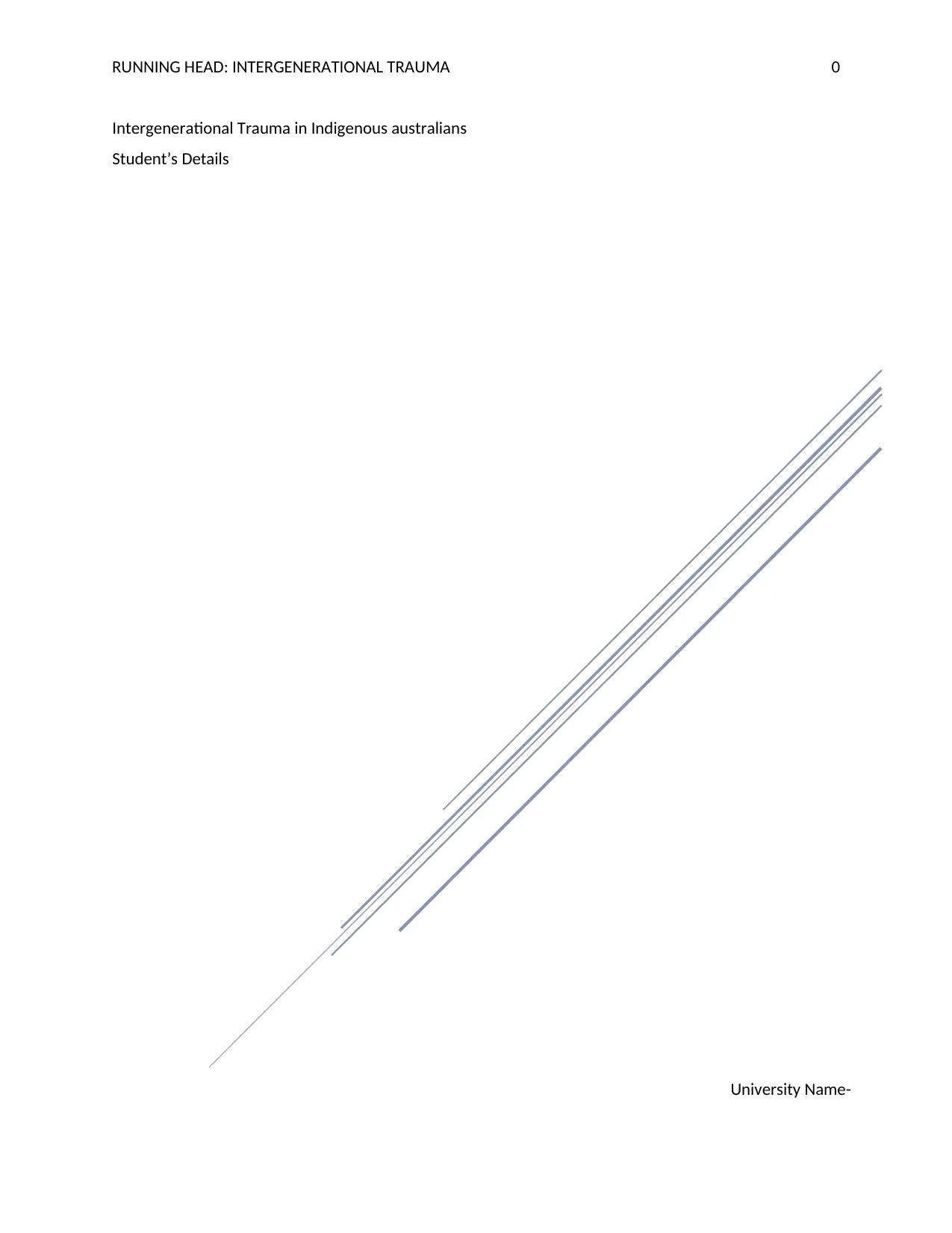
RUNNING HEAD: INTERGENERATIONAL TRAUMA 0
University Name-
Intergenerational Trauma in Indigenous australians
Student’s Details
University Name-
Intergenerational Trauma in Indigenous australians
Student’s Details
Paraphrase This Document
Need a fresh take? Get an instant paraphrase of this document with our AI Paraphraser
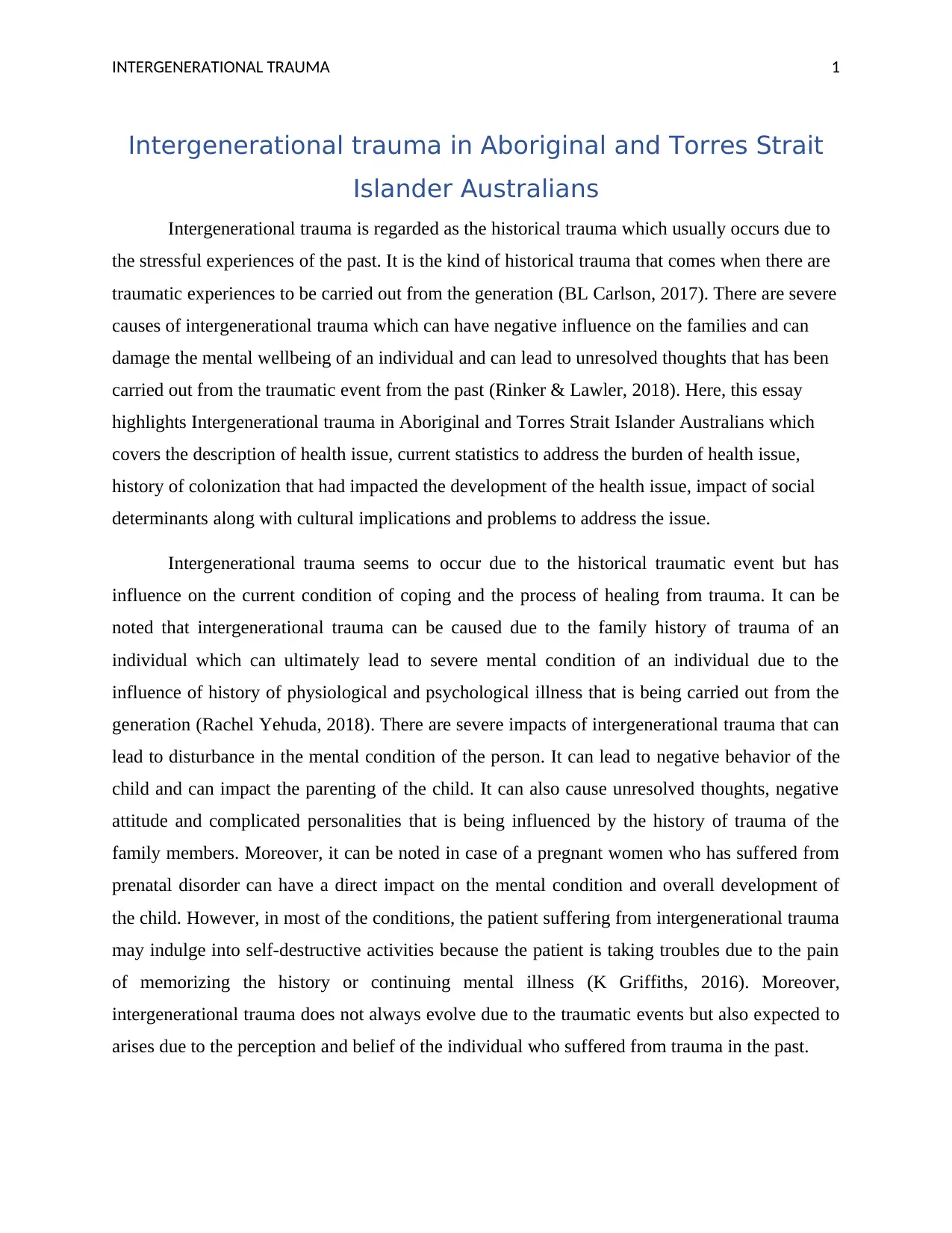
INTERGENERATIONAL TRAUMA 1
Intergenerational trauma in Aboriginal and Torres Strait
Islander Australians
Intergenerational trauma is regarded as the historical trauma which usually occurs due to
the stressful experiences of the past. It is the kind of historical trauma that comes when there are
traumatic experiences to be carried out from the generation (BL Carlson, 2017). There are severe
causes of intergenerational trauma which can have negative influence on the families and can
damage the mental wellbeing of an individual and can lead to unresolved thoughts that has been
carried out from the traumatic event from the past (Rinker & Lawler, 2018). Here, this essay
highlights Intergenerational trauma in Aboriginal and Torres Strait Islander Australians which
covers the description of health issue, current statistics to address the burden of health issue,
history of colonization that had impacted the development of the health issue, impact of social
determinants along with cultural implications and problems to address the issue.
Intergenerational trauma seems to occur due to the historical traumatic event but has
influence on the current condition of coping and the process of healing from trauma. It can be
noted that intergenerational trauma can be caused due to the family history of trauma of an
individual which can ultimately lead to severe mental condition of an individual due to the
influence of history of physiological and psychological illness that is being carried out from the
generation (Rachel Yehuda, 2018). There are severe impacts of intergenerational trauma that can
lead to disturbance in the mental condition of the person. It can lead to negative behavior of the
child and can impact the parenting of the child. It can also cause unresolved thoughts, negative
attitude and complicated personalities that is being influenced by the history of trauma of the
family members. Moreover, it can be noted in case of a pregnant women who has suffered from
prenatal disorder can have a direct impact on the mental condition and overall development of
the child. However, in most of the conditions, the patient suffering from intergenerational trauma
may indulge into self-destructive activities because the patient is taking troubles due to the pain
of memorizing the history or continuing mental illness (K Griffiths, 2016). Moreover,
intergenerational trauma does not always evolve due to the traumatic events but also expected to
arises due to the perception and belief of the individual who suffered from trauma in the past.
Intergenerational trauma in Aboriginal and Torres Strait
Islander Australians
Intergenerational trauma is regarded as the historical trauma which usually occurs due to
the stressful experiences of the past. It is the kind of historical trauma that comes when there are
traumatic experiences to be carried out from the generation (BL Carlson, 2017). There are severe
causes of intergenerational trauma which can have negative influence on the families and can
damage the mental wellbeing of an individual and can lead to unresolved thoughts that has been
carried out from the traumatic event from the past (Rinker & Lawler, 2018). Here, this essay
highlights Intergenerational trauma in Aboriginal and Torres Strait Islander Australians which
covers the description of health issue, current statistics to address the burden of health issue,
history of colonization that had impacted the development of the health issue, impact of social
determinants along with cultural implications and problems to address the issue.
Intergenerational trauma seems to occur due to the historical traumatic event but has
influence on the current condition of coping and the process of healing from trauma. It can be
noted that intergenerational trauma can be caused due to the family history of trauma of an
individual which can ultimately lead to severe mental condition of an individual due to the
influence of history of physiological and psychological illness that is being carried out from the
generation (Rachel Yehuda, 2018). There are severe impacts of intergenerational trauma that can
lead to disturbance in the mental condition of the person. It can lead to negative behavior of the
child and can impact the parenting of the child. It can also cause unresolved thoughts, negative
attitude and complicated personalities that is being influenced by the history of trauma of the
family members. Moreover, it can be noted in case of a pregnant women who has suffered from
prenatal disorder can have a direct impact on the mental condition and overall development of
the child. However, in most of the conditions, the patient suffering from intergenerational trauma
may indulge into self-destructive activities because the patient is taking troubles due to the pain
of memorizing the history or continuing mental illness (K Griffiths, 2016). Moreover,
intergenerational trauma does not always evolve due to the traumatic events but also expected to
arises due to the perception and belief of the individual who suffered from trauma in the past.
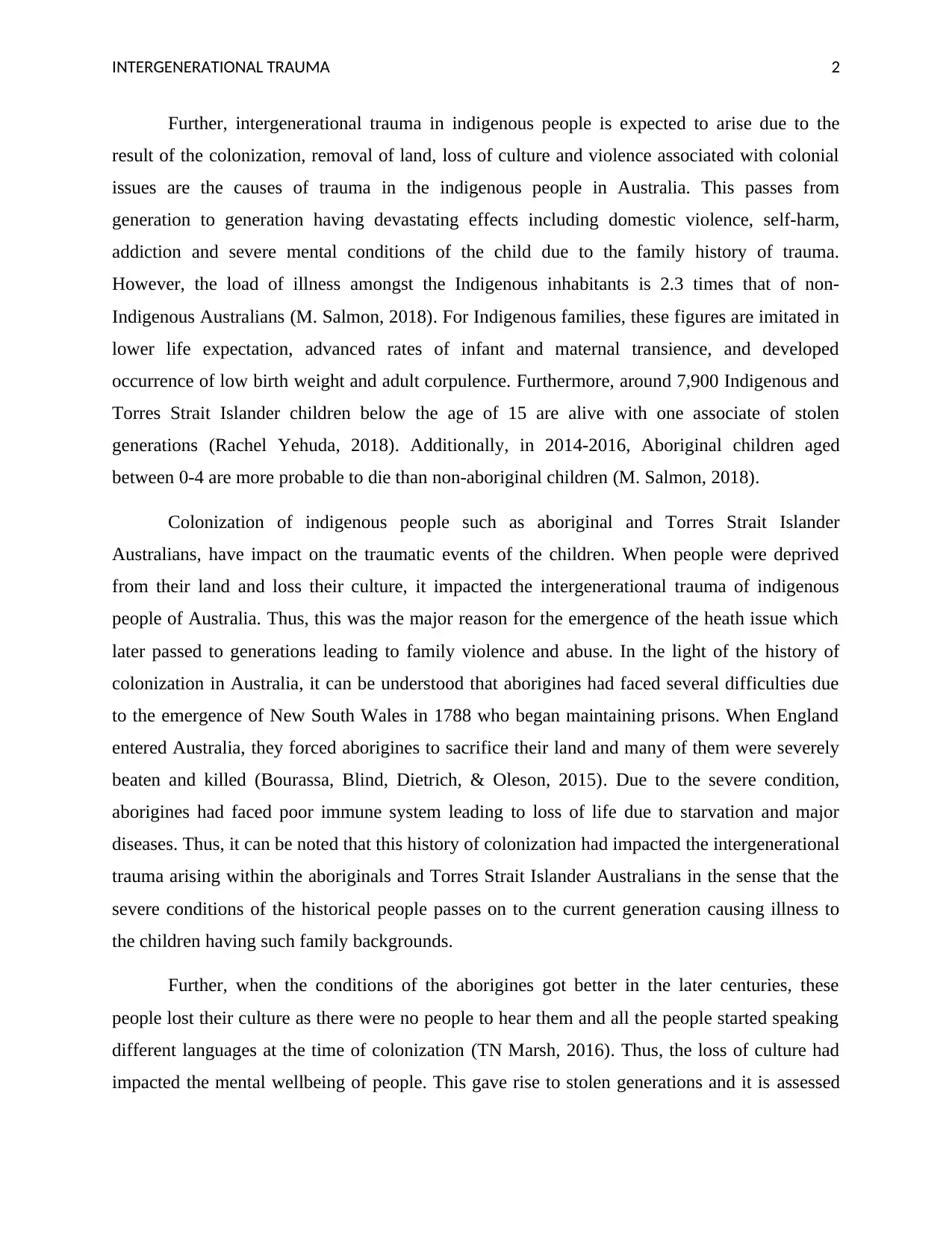
INTERGENERATIONAL TRAUMA 2
Further, intergenerational trauma in indigenous people is expected to arise due to the
result of the colonization, removal of land, loss of culture and violence associated with colonial
issues are the causes of trauma in the indigenous people in Australia. This passes from
generation to generation having devastating effects including domestic violence, self-harm,
addiction and severe mental conditions of the child due to the family history of trauma.
However, the load of illness amongst the Indigenous inhabitants is 2.3 times that of non-
Indigenous Australians (M. Salmon, 2018). For Indigenous families, these figures are imitated in
lower life expectation, advanced rates of infant and maternal transience, and developed
occurrence of low birth weight and adult corpulence. Furthermore, around 7,900 Indigenous and
Torres Strait Islander children below the age of 15 are alive with one associate of stolen
generations (Rachel Yehuda, 2018). Additionally, in 2014-2016, Aboriginal children aged
between 0-4 are more probable to die than non-aboriginal children (M. Salmon, 2018).
Colonization of indigenous people such as aboriginal and Torres Strait Islander
Australians, have impact on the traumatic events of the children. When people were deprived
from their land and loss their culture, it impacted the intergenerational trauma of indigenous
people of Australia. Thus, this was the major reason for the emergence of the heath issue which
later passed to generations leading to family violence and abuse. In the light of the history of
colonization in Australia, it can be understood that aborigines had faced several difficulties due
to the emergence of New South Wales in 1788 who began maintaining prisons. When England
entered Australia, they forced aborigines to sacrifice their land and many of them were severely
beaten and killed (Bourassa, Blind, Dietrich, & Oleson, 2015). Due to the severe condition,
aborigines had faced poor immune system leading to loss of life due to starvation and major
diseases. Thus, it can be noted that this history of colonization had impacted the intergenerational
trauma arising within the aboriginals and Torres Strait Islander Australians in the sense that the
severe conditions of the historical people passes on to the current generation causing illness to
the children having such family backgrounds.
Further, when the conditions of the aborigines got better in the later centuries, these
people lost their culture as there were no people to hear them and all the people started speaking
different languages at the time of colonization (TN Marsh, 2016). Thus, the loss of culture had
impacted the mental wellbeing of people. This gave rise to stolen generations and it is assessed
Further, intergenerational trauma in indigenous people is expected to arise due to the
result of the colonization, removal of land, loss of culture and violence associated with colonial
issues are the causes of trauma in the indigenous people in Australia. This passes from
generation to generation having devastating effects including domestic violence, self-harm,
addiction and severe mental conditions of the child due to the family history of trauma.
However, the load of illness amongst the Indigenous inhabitants is 2.3 times that of non-
Indigenous Australians (M. Salmon, 2018). For Indigenous families, these figures are imitated in
lower life expectation, advanced rates of infant and maternal transience, and developed
occurrence of low birth weight and adult corpulence. Furthermore, around 7,900 Indigenous and
Torres Strait Islander children below the age of 15 are alive with one associate of stolen
generations (Rachel Yehuda, 2018). Additionally, in 2014-2016, Aboriginal children aged
between 0-4 are more probable to die than non-aboriginal children (M. Salmon, 2018).
Colonization of indigenous people such as aboriginal and Torres Strait Islander
Australians, have impact on the traumatic events of the children. When people were deprived
from their land and loss their culture, it impacted the intergenerational trauma of indigenous
people of Australia. Thus, this was the major reason for the emergence of the heath issue which
later passed to generations leading to family violence and abuse. In the light of the history of
colonization in Australia, it can be understood that aborigines had faced several difficulties due
to the emergence of New South Wales in 1788 who began maintaining prisons. When England
entered Australia, they forced aborigines to sacrifice their land and many of them were severely
beaten and killed (Bourassa, Blind, Dietrich, & Oleson, 2015). Due to the severe condition,
aborigines had faced poor immune system leading to loss of life due to starvation and major
diseases. Thus, it can be noted that this history of colonization had impacted the intergenerational
trauma arising within the aboriginals and Torres Strait Islander Australians in the sense that the
severe conditions of the historical people passes on to the current generation causing illness to
the children having such family backgrounds.
Further, when the conditions of the aborigines got better in the later centuries, these
people lost their culture as there were no people to hear them and all the people started speaking
different languages at the time of colonization (TN Marsh, 2016). Thus, the loss of culture had
impacted the mental wellbeing of people. This gave rise to stolen generations and it is assessed
⊘ This is a preview!⊘
Do you want full access?
Subscribe today to unlock all pages.

Trusted by 1+ million students worldwide
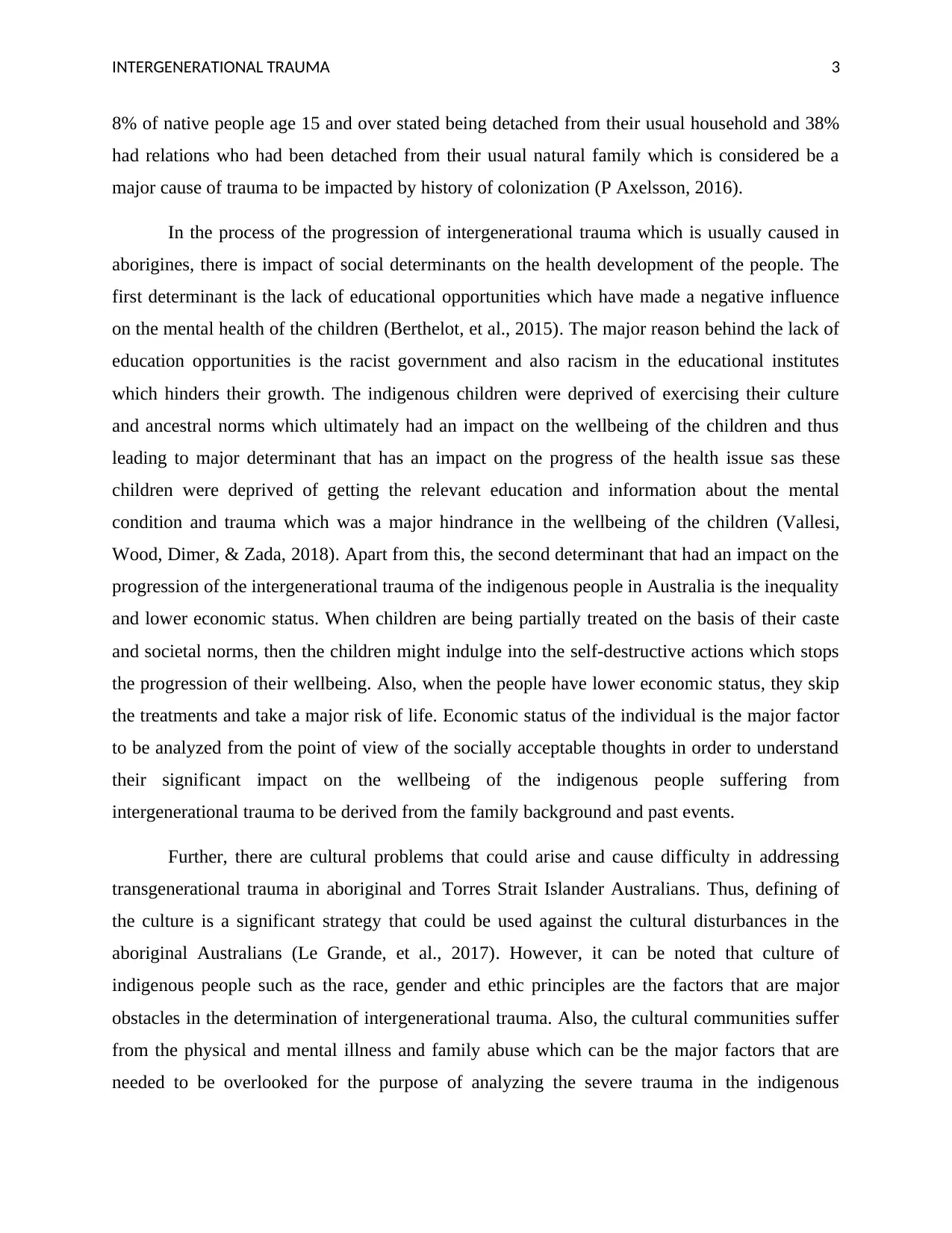
INTERGENERATIONAL TRAUMA 3
8% of native people age 15 and over stated being detached from their usual household and 38%
had relations who had been detached from their usual natural family which is considered be a
major cause of trauma to be impacted by history of colonization (P Axelsson, 2016).
In the process of the progression of intergenerational trauma which is usually caused in
aborigines, there is impact of social determinants on the health development of the people. The
first determinant is the lack of educational opportunities which have made a negative influence
on the mental health of the children (Berthelot, et al., 2015). The major reason behind the lack of
education opportunities is the racist government and also racism in the educational institutes
which hinders their growth. The indigenous children were deprived of exercising their culture
and ancestral norms which ultimately had an impact on the wellbeing of the children and thus
leading to major determinant that has an impact on the progress of the health issue sas these
children were deprived of getting the relevant education and information about the mental
condition and trauma which was a major hindrance in the wellbeing of the children (Vallesi,
Wood, Dimer, & Zada, 2018). Apart from this, the second determinant that had an impact on the
progression of the intergenerational trauma of the indigenous people in Australia is the inequality
and lower economic status. When children are being partially treated on the basis of their caste
and societal norms, then the children might indulge into the self-destructive actions which stops
the progression of their wellbeing. Also, when the people have lower economic status, they skip
the treatments and take a major risk of life. Economic status of the individual is the major factor
to be analyzed from the point of view of the socially acceptable thoughts in order to understand
their significant impact on the wellbeing of the indigenous people suffering from
intergenerational trauma to be derived from the family background and past events.
Further, there are cultural problems that could arise and cause difficulty in addressing
transgenerational trauma in aboriginal and Torres Strait Islander Australians. Thus, defining of
the culture is a significant strategy that could be used against the cultural disturbances in the
aboriginal Australians (Le Grande, et al., 2017). However, it can be noted that culture of
indigenous people such as the race, gender and ethic principles are the factors that are major
obstacles in the determination of intergenerational trauma. Also, the cultural communities suffer
from the physical and mental illness and family abuse which can be the major factors that are
needed to be overlooked for the purpose of analyzing the severe trauma in the indigenous
8% of native people age 15 and over stated being detached from their usual household and 38%
had relations who had been detached from their usual natural family which is considered be a
major cause of trauma to be impacted by history of colonization (P Axelsson, 2016).
In the process of the progression of intergenerational trauma which is usually caused in
aborigines, there is impact of social determinants on the health development of the people. The
first determinant is the lack of educational opportunities which have made a negative influence
on the mental health of the children (Berthelot, et al., 2015). The major reason behind the lack of
education opportunities is the racist government and also racism in the educational institutes
which hinders their growth. The indigenous children were deprived of exercising their culture
and ancestral norms which ultimately had an impact on the wellbeing of the children and thus
leading to major determinant that has an impact on the progress of the health issue sas these
children were deprived of getting the relevant education and information about the mental
condition and trauma which was a major hindrance in the wellbeing of the children (Vallesi,
Wood, Dimer, & Zada, 2018). Apart from this, the second determinant that had an impact on the
progression of the intergenerational trauma of the indigenous people in Australia is the inequality
and lower economic status. When children are being partially treated on the basis of their caste
and societal norms, then the children might indulge into the self-destructive actions which stops
the progression of their wellbeing. Also, when the people have lower economic status, they skip
the treatments and take a major risk of life. Economic status of the individual is the major factor
to be analyzed from the point of view of the socially acceptable thoughts in order to understand
their significant impact on the wellbeing of the indigenous people suffering from
intergenerational trauma to be derived from the family background and past events.
Further, there are cultural problems that could arise and cause difficulty in addressing
transgenerational trauma in aboriginal and Torres Strait Islander Australians. Thus, defining of
the culture is a significant strategy that could be used against the cultural disturbances in the
aboriginal Australians (Le Grande, et al., 2017). However, it can be noted that culture of
indigenous people such as the race, gender and ethic principles are the factors that are major
obstacles in the determination of intergenerational trauma. Also, the cultural communities suffer
from the physical and mental illness and family abuse which can be the major factors that are
needed to be overlooked for the purpose of analyzing the severe trauma in the indigenous
Paraphrase This Document
Need a fresh take? Get an instant paraphrase of this document with our AI Paraphraser
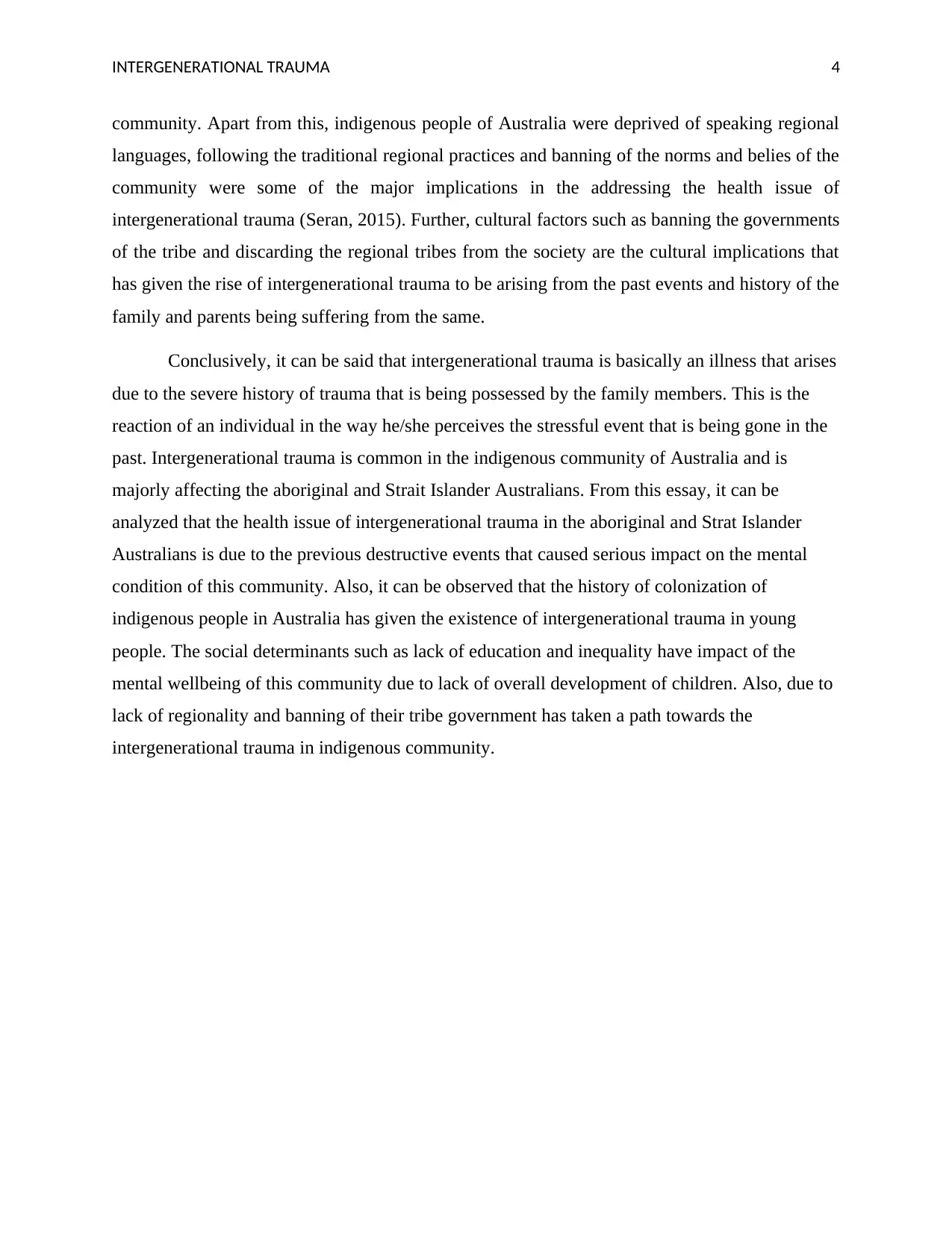
INTERGENERATIONAL TRAUMA 4
community. Apart from this, indigenous people of Australia were deprived of speaking regional
languages, following the traditional regional practices and banning of the norms and belies of the
community were some of the major implications in the addressing the health issue of
intergenerational trauma (Seran, 2015). Further, cultural factors such as banning the governments
of the tribe and discarding the regional tribes from the society are the cultural implications that
has given the rise of intergenerational trauma to be arising from the past events and history of the
family and parents being suffering from the same.
Conclusively, it can be said that intergenerational trauma is basically an illness that arises
due to the severe history of trauma that is being possessed by the family members. This is the
reaction of an individual in the way he/she perceives the stressful event that is being gone in the
past. Intergenerational trauma is common in the indigenous community of Australia and is
majorly affecting the aboriginal and Strait Islander Australians. From this essay, it can be
analyzed that the health issue of intergenerational trauma in the aboriginal and Strat Islander
Australians is due to the previous destructive events that caused serious impact on the mental
condition of this community. Also, it can be observed that the history of colonization of
indigenous people in Australia has given the existence of intergenerational trauma in young
people. The social determinants such as lack of education and inequality have impact of the
mental wellbeing of this community due to lack of overall development of children. Also, due to
lack of regionality and banning of their tribe government has taken a path towards the
intergenerational trauma in indigenous community.
community. Apart from this, indigenous people of Australia were deprived of speaking regional
languages, following the traditional regional practices and banning of the norms and belies of the
community were some of the major implications in the addressing the health issue of
intergenerational trauma (Seran, 2015). Further, cultural factors such as banning the governments
of the tribe and discarding the regional tribes from the society are the cultural implications that
has given the rise of intergenerational trauma to be arising from the past events and history of the
family and parents being suffering from the same.
Conclusively, it can be said that intergenerational trauma is basically an illness that arises
due to the severe history of trauma that is being possessed by the family members. This is the
reaction of an individual in the way he/she perceives the stressful event that is being gone in the
past. Intergenerational trauma is common in the indigenous community of Australia and is
majorly affecting the aboriginal and Strait Islander Australians. From this essay, it can be
analyzed that the health issue of intergenerational trauma in the aboriginal and Strat Islander
Australians is due to the previous destructive events that caused serious impact on the mental
condition of this community. Also, it can be observed that the history of colonization of
indigenous people in Australia has given the existence of intergenerational trauma in young
people. The social determinants such as lack of education and inequality have impact of the
mental wellbeing of this community due to lack of overall development of children. Also, due to
lack of regionality and banning of their tribe government has taken a path towards the
intergenerational trauma in indigenous community.
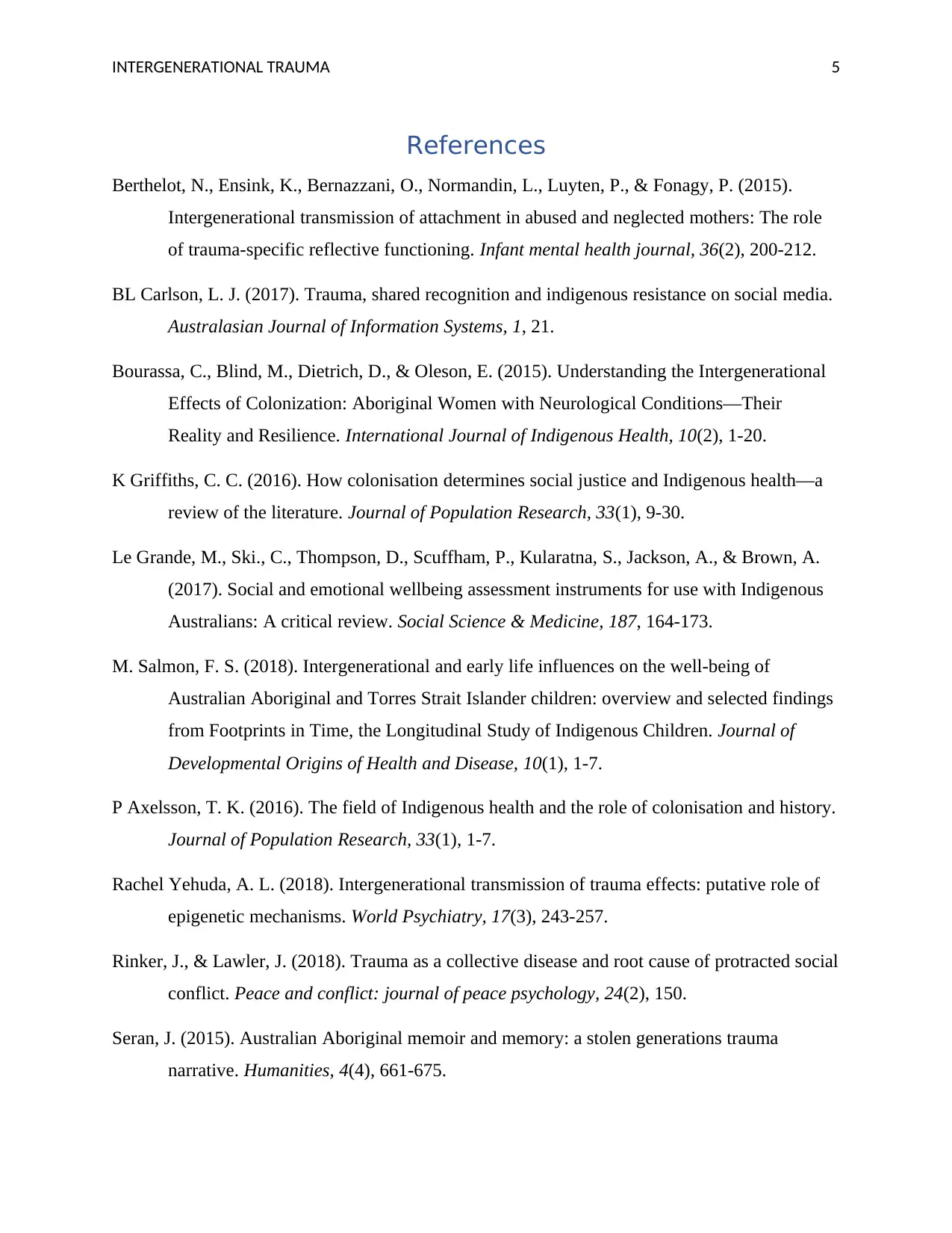
INTERGENERATIONAL TRAUMA 5
References
Berthelot, N., Ensink, K., Bernazzani, O., Normandin, L., Luyten, P., & Fonagy, P. (2015).
Intergenerational transmission of attachment in abused and neglected mothers: The role
of trauma‐specific reflective functioning. Infant mental health journal, 36(2), 200-212.
BL Carlson, L. J. (2017). Trauma, shared recognition and indigenous resistance on social media.
Australasian Journal of Information Systems, 1, 21.
Bourassa, C., Blind, M., Dietrich, D., & Oleson, E. (2015). Understanding the Intergenerational
Effects of Colonization: Aboriginal Women with Neurological Conditions—Their
Reality and Resilience. International Journal of Indigenous Health, 10(2), 1-20.
K Griffiths, C. C. (2016). How colonisation determines social justice and Indigenous health—a
review of the literature. Journal of Population Research, 33(1), 9-30.
Le Grande, M., Ski., C., Thompson, D., Scuffham, P., Kularatna, S., Jackson, A., & Brown, A.
(2017). Social and emotional wellbeing assessment instruments for use with Indigenous
Australians: A critical review. Social Science & Medicine, 187, 164-173.
M. Salmon, F. S. (2018). Intergenerational and early life influences on the well-being of
Australian Aboriginal and Torres Strait Islander children: overview and selected findings
from Footprints in Time, the Longitudinal Study of Indigenous Children. Journal of
Developmental Origins of Health and Disease, 10(1), 1-7.
P Axelsson, T. K. (2016). The field of Indigenous health and the role of colonisation and history.
Journal of Population Research, 33(1), 1-7.
Rachel Yehuda, A. L. (2018). Intergenerational transmission of trauma effects: putative role of
epigenetic mechanisms. World Psychiatry, 17(3), 243-257.
Rinker, J., & Lawler, J. (2018). Trauma as a collective disease and root cause of protracted social
conflict. Peace and conflict: journal of peace psychology, 24(2), 150.
Seran, J. (2015). Australian Aboriginal memoir and memory: a stolen generations trauma
narrative. Humanities, 4(4), 661-675.
References
Berthelot, N., Ensink, K., Bernazzani, O., Normandin, L., Luyten, P., & Fonagy, P. (2015).
Intergenerational transmission of attachment in abused and neglected mothers: The role
of trauma‐specific reflective functioning. Infant mental health journal, 36(2), 200-212.
BL Carlson, L. J. (2017). Trauma, shared recognition and indigenous resistance on social media.
Australasian Journal of Information Systems, 1, 21.
Bourassa, C., Blind, M., Dietrich, D., & Oleson, E. (2015). Understanding the Intergenerational
Effects of Colonization: Aboriginal Women with Neurological Conditions—Their
Reality and Resilience. International Journal of Indigenous Health, 10(2), 1-20.
K Griffiths, C. C. (2016). How colonisation determines social justice and Indigenous health—a
review of the literature. Journal of Population Research, 33(1), 9-30.
Le Grande, M., Ski., C., Thompson, D., Scuffham, P., Kularatna, S., Jackson, A., & Brown, A.
(2017). Social and emotional wellbeing assessment instruments for use with Indigenous
Australians: A critical review. Social Science & Medicine, 187, 164-173.
M. Salmon, F. S. (2018). Intergenerational and early life influences on the well-being of
Australian Aboriginal and Torres Strait Islander children: overview and selected findings
from Footprints in Time, the Longitudinal Study of Indigenous Children. Journal of
Developmental Origins of Health and Disease, 10(1), 1-7.
P Axelsson, T. K. (2016). The field of Indigenous health and the role of colonisation and history.
Journal of Population Research, 33(1), 1-7.
Rachel Yehuda, A. L. (2018). Intergenerational transmission of trauma effects: putative role of
epigenetic mechanisms. World Psychiatry, 17(3), 243-257.
Rinker, J., & Lawler, J. (2018). Trauma as a collective disease and root cause of protracted social
conflict. Peace and conflict: journal of peace psychology, 24(2), 150.
Seran, J. (2015). Australian Aboriginal memoir and memory: a stolen generations trauma
narrative. Humanities, 4(4), 661-675.
⊘ This is a preview!⊘
Do you want full access?
Subscribe today to unlock all pages.

Trusted by 1+ million students worldwide
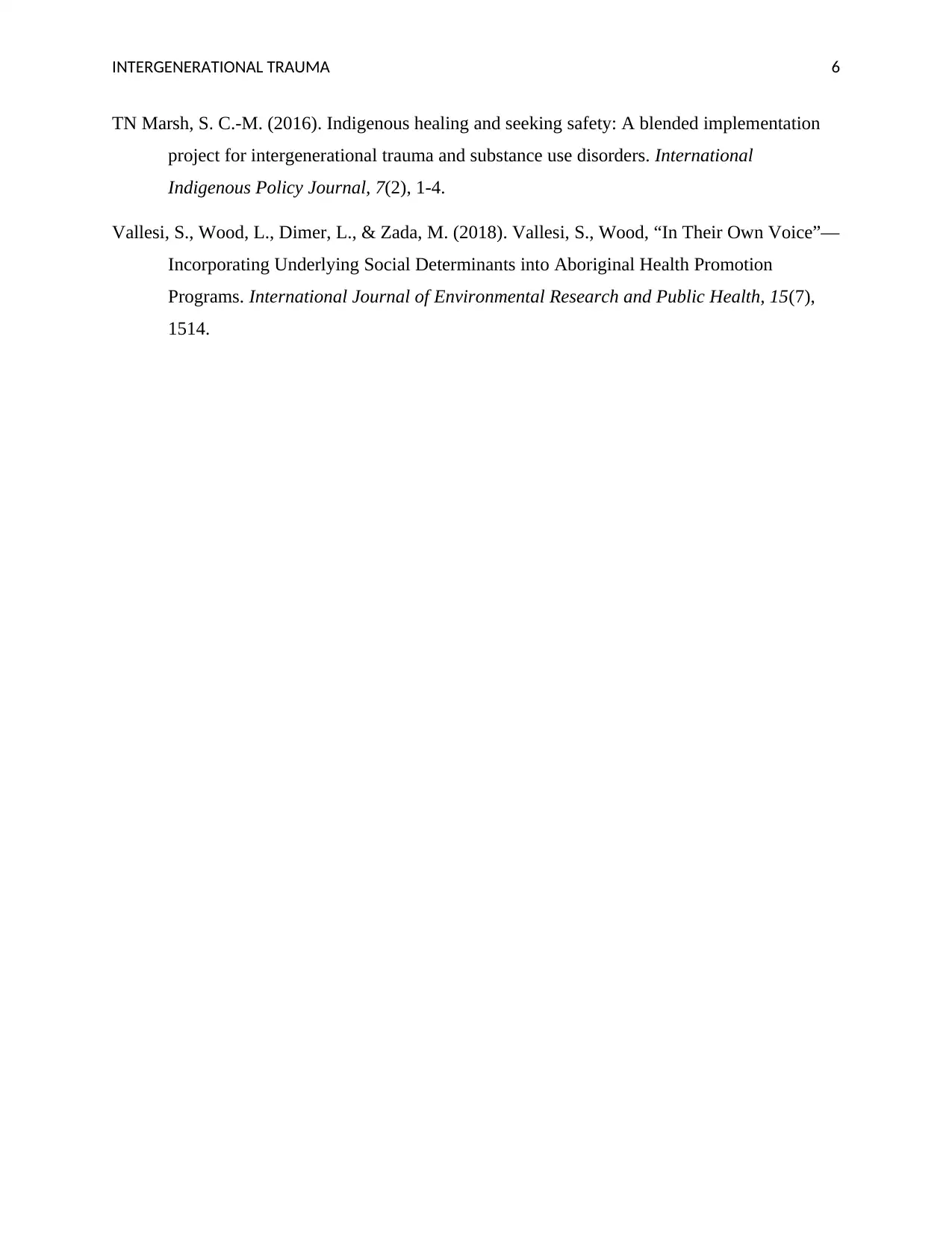
INTERGENERATIONAL TRAUMA 6
TN Marsh, S. C.-M. (2016). Indigenous healing and seeking safety: A blended implementation
project for intergenerational trauma and substance use disorders. International
Indigenous Policy Journal, 7(2), 1-4.
Vallesi, S., Wood, L., Dimer, L., & Zada, M. (2018). Vallesi, S., Wood, “In Their Own Voice”—
Incorporating Underlying Social Determinants into Aboriginal Health Promotion
Programs. International Journal of Environmental Research and Public Health, 15(7),
1514.
TN Marsh, S. C.-M. (2016). Indigenous healing and seeking safety: A blended implementation
project for intergenerational trauma and substance use disorders. International
Indigenous Policy Journal, 7(2), 1-4.
Vallesi, S., Wood, L., Dimer, L., & Zada, M. (2018). Vallesi, S., Wood, “In Their Own Voice”—
Incorporating Underlying Social Determinants into Aboriginal Health Promotion
Programs. International Journal of Environmental Research and Public Health, 15(7),
1514.
1 out of 7
Related Documents
Your All-in-One AI-Powered Toolkit for Academic Success.
+13062052269
info@desklib.com
Available 24*7 on WhatsApp / Email
![[object Object]](/_next/static/media/star-bottom.7253800d.svg)
Unlock your academic potential
Copyright © 2020–2026 A2Z Services. All Rights Reserved. Developed and managed by ZUCOL.




